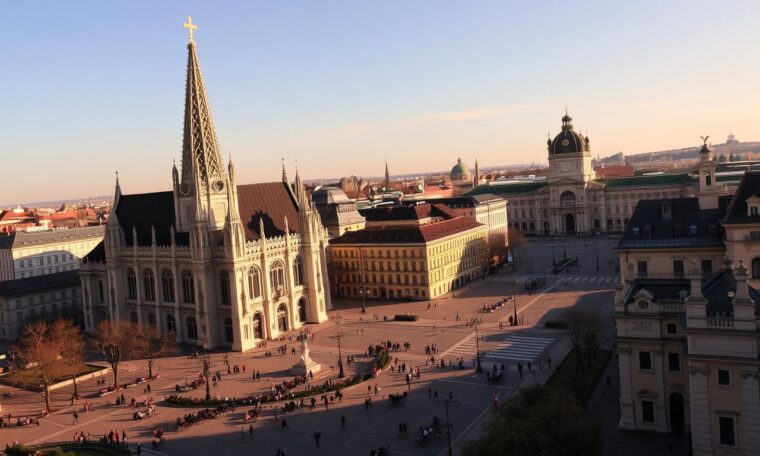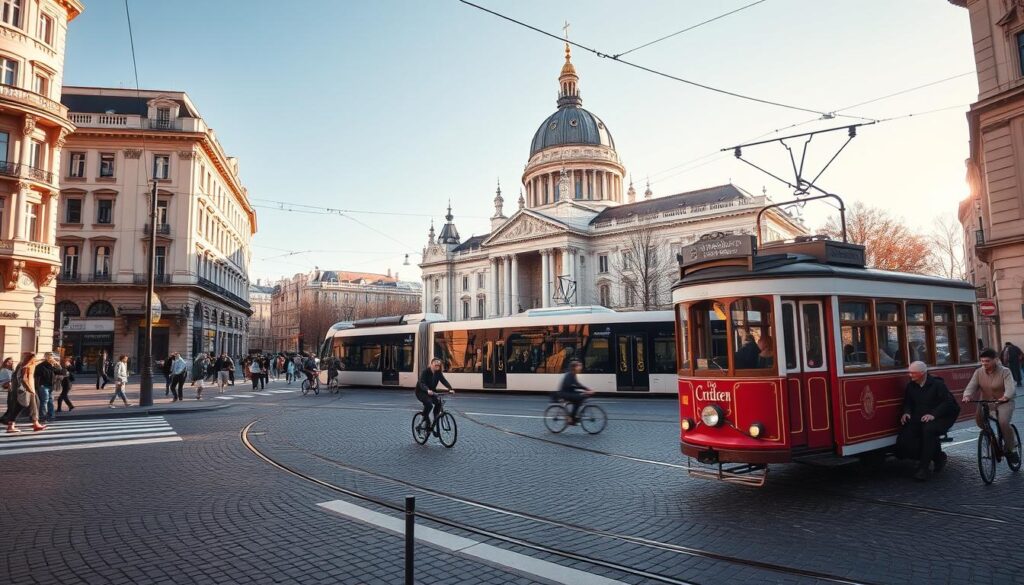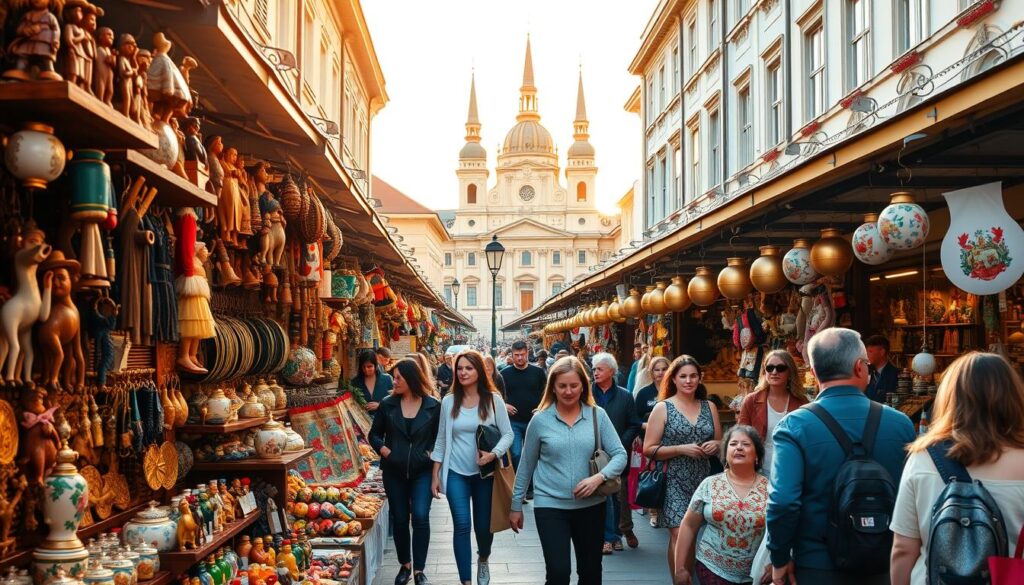
Imagine strolling through the historic streets of Vienna, surrounded by grand architecture and rich history. Vienna, the capital of Austria, is a city that seamlessly blends tradition with modernity, making it a must-visit destination for any traveler.
From its stunning palaces to its vibrant cultural scene, Austria offers a unique travel experience that caters to all interests. Whether you’re a history buff, a foodie, or an adventure seeker, Vienna has something to offer.
Key Takeaways
- Discover Vienna’s rich history and cultural heritage.
- Explore the city’s grand architecture and historic landmarks.
- Enjoy the local cuisine and vibrant cultural scene.
- Visit famous palaces and gardens.
- Experience the unique blend of tradition and modernity.
The Enchanting Appeal of Austria’s Landscape
Austria’s enchanting landscape, steeped in history and natural beauty, makes it an ideal destination for travelers seeking a mix of adventure and relaxation. The country’s diverse geography, featuring the majestic Alps, serene lakes, and historic cities, offers a unique travel experience.
A Land of Alpine Beauty and Imperial History
Austria is renowned for its breathtaking Alpine scenery, which provides ample opportunities for outdoor activities such as hiking, skiing, and mountain biking. The country’s imperial history is evident in its grand palaces, opera houses, and museums, showcasing a rich cultural heritage.
The picturesque towns and villages, with their traditional architecture and charming streets, add to the country’s allure. Visitors can explore historic sites like the Schönbrunn Palace in Vienna, a former imperial summer residence.
| Region | Main Attractions | Activities |
|---|---|---|
| Austrian Alps | Mountain peaks, scenic valleys | Hiking, skiing, mountain biking |
| Vienna | Schönbrunn Palace, St. Stephen’s Cathedral | Cultural tours, opera visits |
| Lakes Region | Serene lakes, picturesque villages | Boating, fishing, swimming |
Why Austria Should Be Your Next Vacation Destination
Austria offers a unique blend of natural beauty, cultural richness, and modern amenities, making it an attractive vacation spot. Visitors can enjoy a range of experiences, from relaxing in the picturesque countryside to exploring the vibrant cities.
The country’s classical music heritage is another significant draw, with numerous festivals and concerts throughout the year. Whether you’re interested in history, culture, or outdoor adventures, Austria has something to offer.
Vienna: The Magnificent Capital City
With its grand palaces and opera houses, Vienna stands as a testament to the country’s imperial past. As the heart of Austria, Vienna is a city that seamlessly blends history with modernity, offering visitors a unique and enriching experience.
Historical Background
Vienna’s rich historical background is evident in its architecture, cultural institutions, and traditional coffeehouses. The city has been a significant cultural and political hub for centuries, attracting artists, musicians, and intellectuals from across Europe.
The historical significance of Vienna is reflected in its landmarks, such as the Hofburg Palace, the former principal imperial palace of the Habsburg dynasty rulers. Vienna’s history is also preserved in its numerous museums and galleries, which showcase the city’s cultural heritage.
Vienna’s Unique Urban Character
Vienna’s urban character is defined by its grand boulevards, picturesque parks, and charming neighborhoods. The city’s layout is a testament to its historical development, with many of its streets and buildings dating back to the imperial era.
The Ringstrasse and Its Architectural Marvels
The Ringstrasse is a grand boulevard that encircles the city center, featuring some of Vienna’s most impressive architectural landmarks, including the Parliament building and the City Hall. This iconic street is a must-visit for anyone interested in Vienna’s history and architecture.
Vienna’s Charming Neighborhoods
Vienna is also known for its charming neighborhoods, each with its unique character and charm. From the trendy boutiques of Neubau to the historic charm of the Innere Stadt, Vienna’s neighborhoods offer a glimpse into the city’s diverse cultural landscape.
Some of the top neighborhoods to explore in Vienna include:
- Innere Stadt: The historic city center, featuring many of Vienna’s iconic landmarks.
- Mariahilfer Strasse: A bustling shopping street lined with boutiques and cafes.
- Neubau: A trendy neighborhood known for its fashionable boutiques and artistic vibe.
Must-Visit Landmarks in Vienna
From grand palaces to historic churches, Vienna’s landmarks are a testament to its rich cultural heritage. The city’s architectural landscape is dotted with magnificent structures that tell the story of its imperial past and its significance in European history.
Schönbrunn Palace: Imperial Grandeur
Schönbrunn Palace, a former imperial summer residence, is one of Vienna’s most iconic landmarks. This Baroque masterpiece boasts over 1,400 rooms, including opulent state rooms and intricately decorated halls. Visitors can explore the palace grounds, which include beautifully manicured gardens and a beautiful fountain.
Belvedere Palace and Its Art Collections
The Belvedere Palace is another architectural gem in Vienna, comprising two Baroque palaces, the Upper and Lower Belvedere, connected by a stunning garden. The palace houses an impressive art collection, featuring works by Austrian artists such as Gustav Klimt and Egon Schiele. The Belvedere’s art collections provide a unique insight into Austria’s rich artistic heritage.
St. Stephen’s Cathedral and Historic Churches
No visit to Vienna would be complete without a visit to St. Stephen’s Cathedral, a magnificent Gothic church that dominates the city’s skyline. The cathedral’s South Tower offers breathtaking views of the city, while its intricate stone carvings and stunning stained-glass windows are a testament to the skill of medieval craftsmen. Vienna is also home to numerous other historic churches, each with its own unique character and history.
These landmarks, among others, make Vienna a city that is steeped in history and culture, offering something for every visitor to enjoy. Whether you’re interested in history, architecture, or simply soaking up the atmosphere, Vienna’s landmarks are sure to leave a lasting impression.
Cultural Experiences in Austria
In Austria, culture is not just a part of the fabric of society; it’s a living, breathing entity that pulsates through every aspect of life. The country’s rich cultural heritage is evident in its classical music and opera traditions, world-class museums, and vibrant festivals throughout the year.
Classical Music and Opera Traditions
Austria is renowned for its contribution to classical music, with legends like Mozart and Strauss having shaped the musical landscape. The Vienna State Opera is a testament to this legacy, offering an unparalleled opera experience.
The Vienna State Opera Experience
Attending a performance at the Vienna State Opera is a must for any classical music aficionado. With its grandiose architecture and world-class performances, it embodies the essence of Austria’s musical heritage.
Mozart, Strauss, and Musical Heritage
The legacy of Mozart and Strauss continues to influence Austria’s musical identity, with numerous festivals and concerts celebrating their works.
Museums and Art Galleries
Austria is home to numerous museums and art galleries, such as the Kunsthistorisches Museum and the Belvedere Palace, which house an impressive collection of art and historical artifacts.
Festivals and Events Throughout the Year
Austria hosts a variety of festivals and events, from the Vienna Opera Ball to the Salzburg Festival, showcasing the country’s rich cultural diversity.
Austrian Cuisine: A Gastronomic Adventure
Austria’s food scene is a reflection of its history, geography, and the warmth of its people. Austrian cuisine is known for its hearty dishes, rich pastries, and coffee culture, making it a paradise for food lovers.
Traditional Dishes You Must Try
Austrian cuisine offers a variety of traditional dishes that are both flavorful and satisfying. Two of the most iconic dishes are Wiener Schnitzel and Tafelspitz.
Wiener Schnitzel and Tafelspitz
Wiener Schnitzel, a breaded and fried veal cutlet, is a classic Austrian dish that originated in Vienna. It’s typically served with a side of potato salad or fries. Tafelspitz, boiled beef in broth served with horseradish and apple-horseradish sauce, is another beloved dish, often considered Austria’s national dish.
Sweet Treats: Sachertorte and Apfelstrudel
No visit to Austria is complete without indulging in its famous desserts. Sachertorte, a rich chocolate cake, and Apfelstrudel, a classic apple strudel, are must-try treats. These desserts are not only delicious but also deeply rooted in Austrian culinary tradition.
Vienna’s Famous Coffee House Culture
Vienna’s coffee houses are an integral part of Austrian culture, serving as social hubs where locals and visitors alike can enjoy a cup of coffee and traditional Viennese pastries. The coffee house culture in Vienna is a UNESCO Intangible Cultural Heritage, highlighting its significance.
“The Viennese coffee house is a institution that cannot be transplanted. It is tied to the soil of Vienna, to the Viennese way of life.” –
Wine Regions and Tasting Opportunities
Austria is also renowned for its wine production, with regions like the Wachau Valley and Burgenland offering excellent wines. Visitors can enjoy wine tastings and tours, exploring the diverse range of Austrian wines.
Navigating Transportation in Austria
Navigating Austria is a breeze, thanks to its efficient and well-connected transportation system. Whether you’re exploring the historic streets of Vienna or traveling to other charming Austrian towns, getting around is easy and convenient.
Vienna’s Efficient Public Transit System
Vienna’s public transportation network is one of the best in Europe, comprising an extensive system of trams, metros, and buses. This comprehensive network ensures that all areas of the city are accessible.
Trams, Metros, and Buses
The city’s trams, metros, and buses are reliable and frequent, making it simple to get around without a car. The metro system, in particular, is an efficient way to cover long distances quickly.
- Trams cover most areas of the city.
- Metros provide fast transportation across Vienna.
- Buses complement the tram and metro network, ensuring comprehensive coverage.
Vienna City Card Benefits
The Vienna City Card offers numerous benefits, including free travel on public transportation, discounts at various attractions, and more. It’s an excellent option for tourists to explore the city hassle-free.
“The Vienna City Card is your key to Vienna. With free travel on public transport and discounts on many attractions, it’s the perfect companion for your visit.”
Traveling Between Austrian Cities
Austria’s cities are well-connected by trains and buses, making inter-city travel straightforward. The ÖBB (Austrian Federal Railways) operates efficient train services, including high-speed trains that connect major cities like Vienna, Salzburg, and Innsbruck.

Where to Stay: Accommodation Options
From luxury hotels to budget-friendly hostels, Vienna’s accommodation options cater to all tastes and preferences. Whether you’re visiting for business or leisure, finding the right place to stay is essential for a memorable trip.
Luxury Hotels with Historical Significance
Vienna is home to many luxurious hotels that are steeped in history. The Hotel Sacher, famous for its Sachertorte, offers an elegant stay, while the Grand Hotel Europa provides a blend of modern comfort and historical charm. These hotels offer a unique experience, combining luxury with a touch of Vienna’s imperial past.
Boutique and Mid-Range Accommodations
For those seeking a more personalized experience, Vienna’s boutique hotels are an excellent choice. Hotels like Hotel Amadeus and Hotel Mozart offer cozy atmospheres and are often located in quiet, picturesque areas. Mid-range options provide a balance between comfort and affordability, making them ideal for travelers who want to explore Vienna without breaking the bank.
Budget-Friendly Stays
Vienna also offers a variety of budget-friendly accommodations, including hostels and guesthouses. These options are perfect for backpackers and travelers on a tight budget. Many hostels are centrally located, offering easy access to Vienna’s main attractions.
| Accommodation Type | Price Range | Features |
|---|---|---|
| Luxury Hotels | $200-$500 per night | Historical significance, high-end amenities, excellent service |
| Boutique & Mid-Range | $100-$200 per night | Personalized service, cozy atmosphere, central locations |
| Budget-Friendly | $20-$50 per night | Affordable, social atmosphere, basic amenities |
Shopping and Souvenirs in Austria
Austria, known for its rich history and cultural heritage, offers a unique shopping experience that blends traditional crafts with modern luxury. Visitors can explore a variety of shopping districts, discover traditional Austrian crafts, and find the perfect souvenirs to bring home.
Vienna’s Shopping Districts
Vienna is a shopper’s paradise, with several districts offering a range of shopping experiences. The Graben and Kärntner Straße are among the most popular shopping streets, lined with high-end boutiques, souvenir shops, and cafes. The Naschmarkt, Vienna’s largest market, is another must-visit destination, offering a mix of fresh produce, artisanal goods, and unique souvenirs.

Traditional Austrian Crafts and Products
Austria is renowned for its traditional crafts, including hand-made pottery, intricate woodcarvings, and delicate glassware. Visitors can find these unique products in local markets and specialty stores. Some popular traditional Austrian items include:
- Hand-painted ceramics from Gmunden
- Intricately designed crystal from Swarovski
- Traditional Austrian clothing, such as Dirndls and Lederhosen
Best Souvenirs to Bring Home
When it comes to souvenirs, Austria offers a wide range of options. Some of the best items to bring home include:
| Souvenir | Description |
|---|---|
| Mozart-themed items | Perfect for music lovers, these souvenirs range from figurines to CDs featuring Mozart’s compositions. |
| Austrian sweets | Bring home the taste of Austria with traditional sweets like Sacher Torte and Apple Strudel. |
| Handicrafts | Unique handicrafts, such as hand-woven textiles and pottery, make for memorable souvenirs. |
Beyond Vienna: Exploring Austria’s Other Treasures
Venturing beyond Vienna reveals the rich tapestry of Austria’s cultural and natural heritage. While the capital city is renowned for its historical significance and cultural landmarks, other destinations in Austria offer unique experiences that showcase the country’s diverse landscapes and traditions.
Salzburg: The City of Mozart
Salzburg is a city steeped in history and culture, famous as the birthplace of Wolfgang Amadeus Mozart. Its picturesque streets, baroque architecture, and the iconic Hohensalzburg Fortress make it a must-visit destination. Visitors can stroll through the historic city center, a UNESCO World Heritage Site, and enjoy the city’s vibrant music scene.
Innsbruck and the Alpine Experience
Innsbruck offers an entirely different experience, centered around its Alpine surroundings. The city hosted the Winter Olympics twice and is a paradise for ski enthusiasts and hikers. The Nordkette mountains provide a dramatic backdrop, and the city’s historic center features charming streets and buildings like the Golden Roof.
Hallstatt: Picturesque Lakeside Village
Hallstatt is a tiny village on the shores of Hallstätter See, known for its stunning natural beauty and traditional Austrian culture. Visitors can explore the village’s charming houses, visit the salt mines, and enjoy the serene lake surroundings. It’s a perfect spot for those seeking tranquility and picturesque landscapes.
The Wachau Valley and Danube River
The Wachau Valley, a UNESCO World Heritage Site, is another gem along the Danube River. It’s known for its vineyards, charming villages, and historic sites. Visitors can enjoy a boat ride along the Danube, explore the ruins of Aggstein Castle, and sample some of the region’s renowned wines.
| Destination | Main Attractions | Best Time to Visit |
|---|---|---|
| Salzburg | Hohensalzburg Fortress, Mozart’s Birthplace | Spring and Autumn |
| Innsbruck | Nordkette Mountains, Golden Roof | Winter for skiing, Summer for hiking |
| Hallstatt | Hallstätter See, Salt Mines | Spring and Summer |
| Wachau Valley | Danube River, Vineyards, Aggstein Castle | Autumn for wine harvest |
Practical Tips for Your Austrian Adventure
To ensure a memorable and hassle-free trip to Austria, understanding some key practical aspects is crucial. Whether you’re visiting Vienna or exploring the Austrian countryside, being prepared can make all the difference.
Best Time to Visit Austria
Austria is a year-round destination, but the best time to visit depends on your preferences. Summer (June to August) is ideal for outdoor activities and festivals, while winter (December to February) is perfect for skiing and Christmas markets. Spring (April to May) and autumn (September to October) offer mild weather and fewer tourists.
Language and Communication
While German is the official language, English is widely spoken, especially among the younger population and in tourist areas. It’s still a good idea to learn basic German phrases like “Danke” (thank you) and “Bitte” (please) to show respect for the culture.
Currency and Payment Methods
The Euro is the official currency in Austria. Credit cards are widely accepted, and ATMs are readily available. It’s a good idea to have some cash on hand, especially for small purchases or at traditional markets.
| Currency | Credit Card Acceptance | ATM Availability |
|---|---|---|
| Euro | High | High |
Travel Considerations for American Visitors
For American travelers, Austria is generally a safe destination. However, it’s always wise to take normal precautions to protect yourself and your belongings. Ensure your passport is valid for at least six months beyond your planned departure date, and consider purchasing travel insurance.
“Austria is a country that seamlessly blends tradition with modernity, making it a fascinating destination for travelers from around the world.”
By considering these practical tips, you can enhance your Austrian adventure and create lasting memories of your time in this beautiful country.
Conclusion: The Timeless Charm of Austria
Austria’s enchanting landscape, rich history, and vibrant culture make it a dream destination for travelers. From the majestic grandeur of Vienna’s palaces to the picturesque beauty of Hallstatt, Austria offers a unique blend of imperial heritage and natural splendor.
Visitors to Austria can indulge in a world of classical music, opera, and art, while also savoring the country’s renowned cuisine and wine. Whether exploring the charming streets of Salzburg, experiencing the thrill of Innsbruck’s Alpine adventures, or simply relaxing in a traditional Viennese coffeehouse, Austria has something to offer every kind of traveler.
With its timeless charm and captivating beauty, Austria is a destination that will leave you with unforgettable memories. As you plan your next adventure, consider immersing yourself in the magic of Austria, a country that seamlessly blends tradition and modernity.
